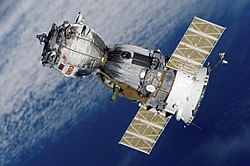 The launch of Soyuz MS-11 | |
| Operator | Roscosmos |
|---|---|
| COSPAR ID | 2018-098A |
| SATCAT no. | 43756 |
| Mission duration | 203d 15h 15m 58s [1] |
| Distance travelled | 86,430,555 statue miles [2] |
| Orbits completed | 3264 [1] |
| Spacecraft properties | |
| Spacecraft type | Soyuz-MS 11F747 No. 741 |
| Manufacturer | Energia |
| Crew | |
| Crew size | 3 |
| Members | Oleg Kononenko Anne McClain David Saint-Jacques |
| Callsign | Antares |
| Start of mission | |
| Launch date | 3 December 2018, 11:31 UTC [3] |
| Rocket | Soyuz-FG |
| Launch site | Baikonur, Site 1/5 |
| Contractor | RKTs Progress |
| End of mission | |
| Landing date | 25 June 2019, 02:47:50 UTC [1] |
| Landing site | 148 km SE of Dzheskasgan [1] |
| Orbital parameters | |
| Reference system | Geocentric |
| Regime | Low Earth |
| Inclination | 51.6º [1] |
| Docking with ISS | |
| Docking port | Poisk zenith |
| Docking date | 3 December 2018, 17:33 UTC |
| Undocking date | 24 June 2019, 23:25:30 UTC [1] |
| Time docked | 203d 5h 52m |
 Mission insignia  (l-r) McClain, Kononenko and Saint-Jacques | |
Soyuz MS-11 was a Soyuz spaceflight that launched on 3 December 2018, marking the 100th orbital launch of the year. [3] Originally scheduled for 20 December, the launch date was advanced to 3 December following the failure of Soyuz MS-10. [4] MS-11 was the 140th flight of a Soyuz spacecraft and carried the three members of the Expedition 58 crew to the International Space Station. The crew consisted of a Russian commander, an American flight engineer, and a Canadian flight engineer. [3]

